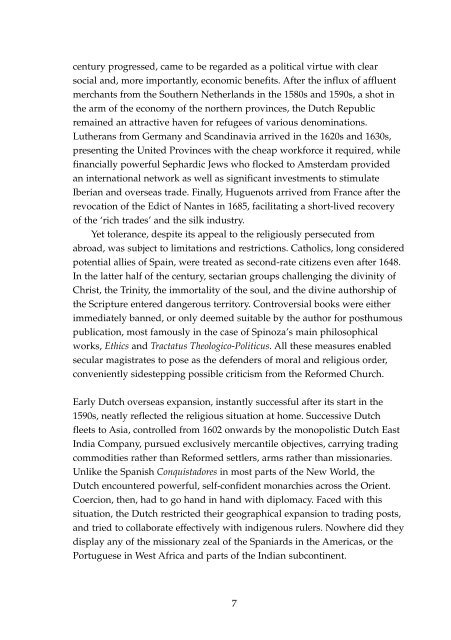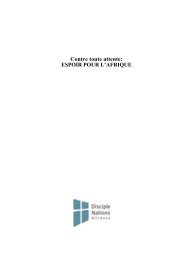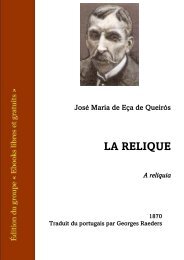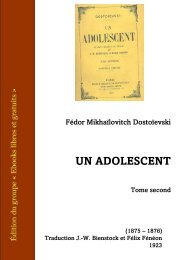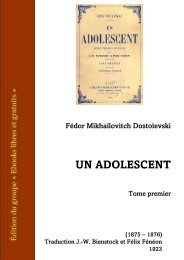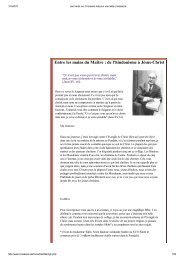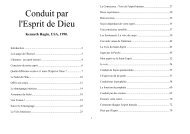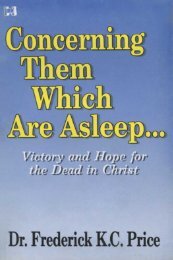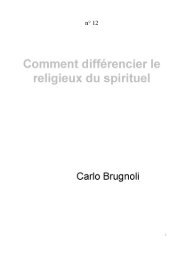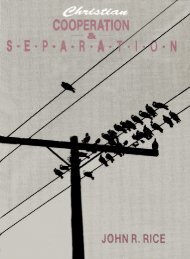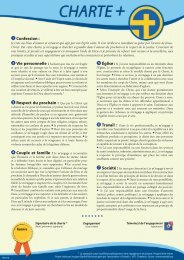The Expansion of tolerance
Create successful ePaper yourself
Turn your PDF publications into a flip-book with our unique Google optimized e-Paper software.
century progressed, came to be regarded as a political virtue with clear<br />
social and, more importantly, economic benefits. After the influx <strong>of</strong> affluent<br />
merchants from the Southern Netherlands in the 1580s and 1590s, a shot in<br />
the arm <strong>of</strong> the economy <strong>of</strong> the northern provinces, the Dutch Republic<br />
remained an attractive haven for refugees <strong>of</strong> various denominations.<br />
Lutherans from Germany and Scandinavia arrived in the 1620s and 1630s,<br />
presenting the United Provinces with the cheap workforce it required, while<br />
financially powerful Sephardic Jews who flocked to Amsterdam provided<br />
an international network as well as significant investments to stimulate<br />
Iberian and overseas trade. Finally, Huguenots arrived from France after the<br />
revocation <strong>of</strong> the Edict <strong>of</strong> Nantes in 1685, facilitating a short-lived recovery<br />
<strong>of</strong> the ‘rich trades’ and the silk industry.<br />
Yet <strong>tolerance</strong>, despite its appeal to the religiously persecuted from<br />
abroad, was subject to limitations and restrictions. Catholics, long considered<br />
potential allies <strong>of</strong> Spain, were treated as second-rate citizens even after 1648.<br />
In the latter half <strong>of</strong> the century, sectarian groups challenging the divinity <strong>of</strong><br />
Christ, the Trinity, the immortality <strong>of</strong> the soul, and the divine authorship <strong>of</strong><br />
the Scripture entered dangerous territory. Controversial books were either<br />
immediately banned, or only deemed suitable by the author for posthumous<br />
publication, most famously in the case <strong>of</strong> Spinoza’s main philosophical<br />
works, Ethics and Tractatus <strong>The</strong>ologico-Politicus. All these measures enabled<br />
secular magistrates to pose as the defenders <strong>of</strong> moral and religious order,<br />
conveniently sidestepping possible criticism from the Reformed Church.<br />
Early Dutch overseas expansion, instantly successful after its start in the<br />
1590s, neatly reflected the religious situation at home. Successive Dutch<br />
fleets to Asia, controlled from 1602 onwards by the monopolistic Dutch East<br />
India Company, pursued exclusively mercantile objectives, carrying trading<br />
commodities rather than Reformed settlers, arms rather than missionaries.<br />
Unlike the Spanish Conquistadores in most parts <strong>of</strong> the New World, the<br />
Dutch encountered powerful, self-confident monarchies across the Orient.<br />
Coercion, then, had to go hand in hand with diplomacy. Faced with this<br />
situation, the Dutch restricted their geographical expansion to trading posts,<br />
and tried to collaborate effectively with indigenous rulers. Nowhere did they<br />
display any <strong>of</strong> the missionary zeal <strong>of</strong> the Spaniards in the Americas, or the<br />
Portuguese in West Africa and parts <strong>of</strong> the Indian subcontinent.<br />
7


